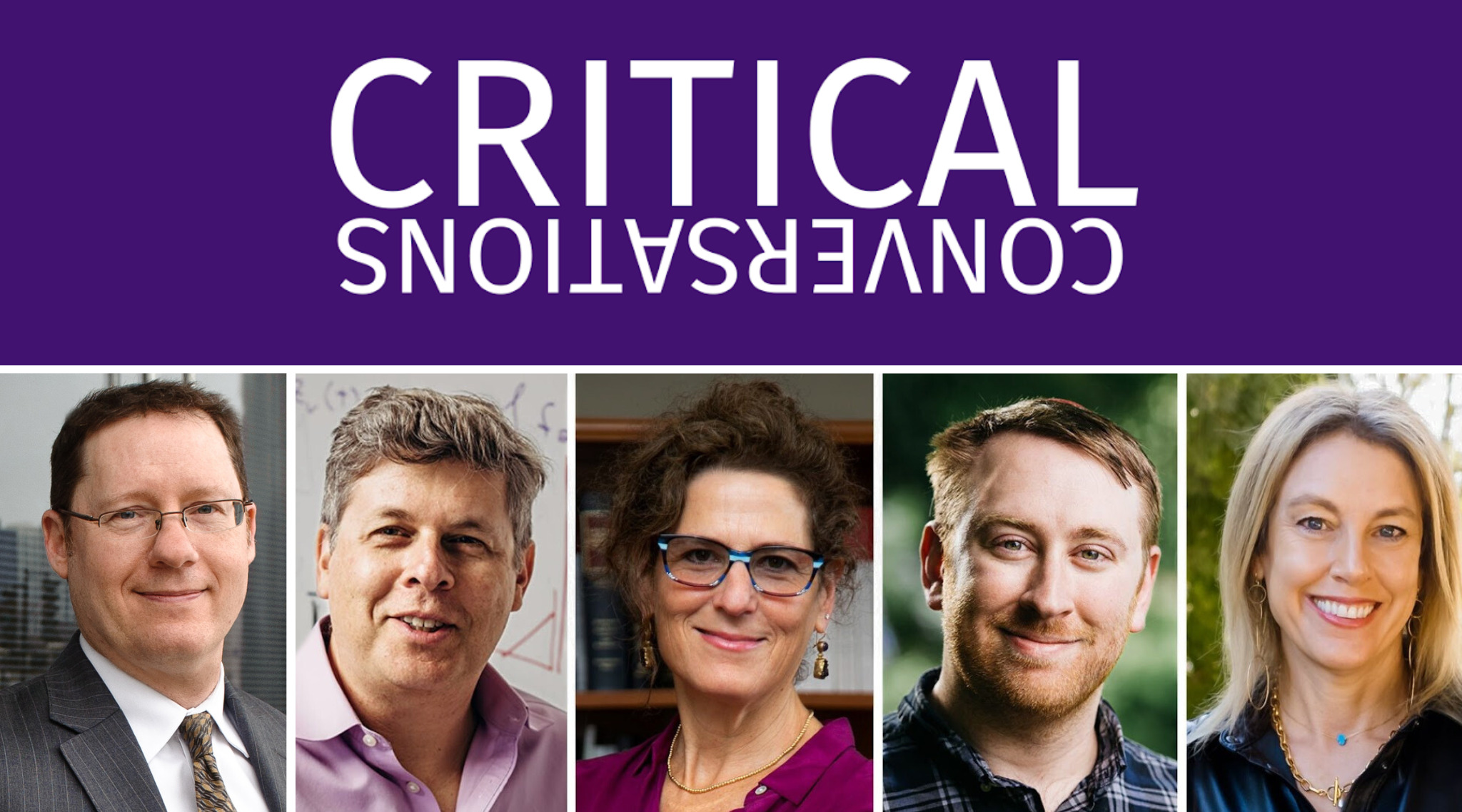Will the advent of artificial intelligence usher in a new age of prosperity and efficiency, or will it hasten the downfall of civilization as we know it?
While tech leaders and government regulators race to establish new practical and legal frameworks to determine how computer automation and algorithmic decision-making will impact our lives, Spertus Institute, the Chicago-based institution of Jewish learning and leadership, is asking a different question.
What does Judaism have to say about AI?
That question is the focus of Spertus Institute’s annual Critical Conversations program on March 17 — a free online event that will bring together some top Jewish thinkers for a discussion about the future of technology, learning, ethics and human progress. In line with Jewish tradition, plenty of disagreement is expected. The event, “Critical Conversations: Artificial Intelligence, Jewish Ethics, and the Future of Humanity,” will begin at 7 PM Central time (8 PM Eastern).
For Spertus Institute, founded 100 years ago to focus on Jewish education dedicated to real-world action, it’s natural to hold a uniquely Jewish discussion about cutting-edge technologies like ChatGPT, said Dean Bell, president & CEO of Spertus.
“AI raises some really interesting questions about how we think and engage with Jewish law in a traditional, broader world,” Bell said. “How will technology affect how we think, how we learn? What does it mean for humanity and its possibilities? There are so many rich and interesting topics for us to explore.”
The panelists for the conversation will be AI researcher and entrepreneur Oren Etzioni, technology law expert Ellen Goodman, scholar and entrepreneur David Zvi Kalman, and tech policy law professor Orly Lobel.
“It is critical to bring a Jewish lens to how we frame these discussions,” Bell said, “how to think about big issues like regulation, autonomy, and even humanity’s role in creation. So even if it’s not purely a Jewish conversation, there are Jewish elements that will be helpful in this discussion.”
Lobel, who has advised global policymakers including former president Barack Obama, says that AI can be used for good or ill.
“When we talk about Jewish ethics and tikkun olam (repairing the world), we have people using technology to tackle problems ranging from hate speech and poverty to climate change and environmental issues,” Lobel said. “There are a lot of opportunities to use data and machine learning to tackle those problems. But the very same tools can also be used to exacerbate those problems. That’s the tension here.”
The issue now isn’t whether or not to use AI — the genie is already out of the bottle, she noted — but how to ensure we use it for good. In her latest book, “The Equality Machine: Harnessing Digital Technology for a Brighter, More Inclusive Future,” Lobel argues that we can direct the course of technological development in a way that aligns with our values.
She uses a Jewish analogy as a frame of reference.
“One thing we see in the analytical process used in the Talmud is that it can be hard to translate abstract concepts into clear actions and specific policies,” Lobel said. “You have to start by understanding the greater purpose of the technology and embracing the potential.”
The application of AI will look different in every field, whether transportation, healthcare, education or even the fight against antisemitism.
Widespread AI adoption will lead to massive shifts in the labor market, forcing workers to adapt and reskill to keep pace, Lobel predicts. She said the US should learn some lessons from the social welfare policies of Israel, where she got her first degree in law at Tel Aviv University, to help citizens navigate the upcoming turmoil.
“This is a moment where the United States will have to look more at job retraining, income redistribution and social welfare policies that will help people stay financially afloat during these upheavals,” Lobel said. “We need to acknowledge that change is going to come quickly, and that it is going to cause new challenges like people losing their jobs. We shouldn’t slow down progress, but we need to prepare for disruption.”
Kalman, the entrepreneur and scholar who serves as a research fellow at the Shalom Hartman Institute, says the idea that machines can possess intelligence similar to that of humans introduces a variety of new philosophical dilemmas challenging classical religious thought.
“One is theological: If human beings have created something that is capable of doing things that are distinctly human, then should we think about ourselves as almost godlike?” Kalman asked. “Another issue relates to pedagogy: How does AI affect religious practices and the digitization of Jewish knowledge transmission? These are conversations that Jews are having.”
Discussions about AI policy and regulation are the “least Jewish” of the philosophical dilemmas posed by AI, Kalman said, but there, too, Judaism may have something to say.
“There are Jewish conversations around every social issue — from charity to immigration to abortion — so neglecting these critical topics would be a failure that I believe would lead Judaism towards ethical obsolescence.”
The other two panelists at the March 17 Critical Conversations program will raise other issues. Goodman, a Rutgers University professor whose legal expertise includes AI and digital platform policy, is a senior advisor for algorithmic justice at the National Telecommunications and Information Administration of the US Department of Commerce. She also co-founded and co-directs the Rutgers Institute for Information Policy & Law.
Etzioni, founder of several companies, is also the leader of True Media, a nonprofit dedicated to fighting deep fakes in politics and a professor at the University of Washington. In 2014, he was the founding CEO of the Allen Institute for AI.
Spertus Institute offers graduate, certificate, and public programs in Jewish studies and leadership to hundreds of students in Chicago and worldwide. Its Critical Conversations program was founded in 2017 and has focused on hot-button issues including antisemitism, climate change, race and immigration.
Critical Conversations: Artificial Intelligence, Jewish Ethics, and the Future of Humanity, will take place online on Sunday, March 17, at 7 p.m. (CT). Tickets are free. Reservations are required and can be made at spertus.edu/conversation.
JTA has documented Jewish history in real-time for over a century. Keep our journalism strong by joining us in supporting independent, award-winning reporting.
This article is sponsored by and produced in collaboration with Spertus Institute for Jewish Learning and Leadership, a Chicago-based institution of higher Jewish learning dedicated to real-world action. This story was produced by JTA’s native content team.
More from Spertus Institute for Jewish Learning and Leadership





